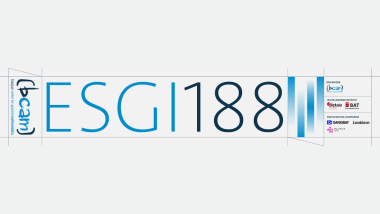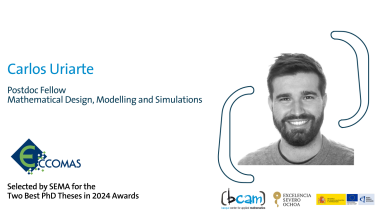Andrea Trucchia will defend his doctoral thesis on Friday, October 25th
- The defense will take place at the “Salón de Grados” of the Faculty of Science and Technology of the UPV/EHU, at 11:00 am
Andrea Trucchia holds a Bachelor’s degree in Mathematics, obtained at University of Camerino (Italy) in 2012, and a Master’s degree in Mathematical Engineering obtained in 2014 at the Polytechnic University of Turin (Italy). Before joining the Basque Center for Applied Mathematics - BCAM he had a research grant at the Department of Aerospace Engineering of the same university.
From October 2015 to September 2019 he was a PhD student at BCAM (La Caixa 2014) within the Statistical Physics research line. He completed a research stay at CERFACS, the European Centre for Advanced Research and Training in Scientific Computing located in Toulouse (France), between September 2017 and March 2018. He is currently working as a researcher at CIMA, the International Center for Environmental Monitoring located in Savona (Italy).
His PhD thesis, Front Propagation in Random Media, has been supervised by Ikerbasque Research Associate Gianni Pagnini.
On behalf of all BCAM members, we would like to wish Andrea the best of luck in his upcoming thesis defense.
PhD thesis Title: Front Propagation in Random Media
This PhD thesis deals with the problem of the propagation of fronts under random circumstances. A statistical model to represent the motion of fronts when are evolving in a media characterized by microscopical randomness is discussed and expanded, in order to cope with three distinct applications: wild-land fire simulation, turbulent premixed combustion, biofilm modeling. In the studied formalism, the position of the average front is computed by making use of a sharp-front evolution method, such as the level set method. The microscopical spread of particles which takes place around the average front is given by the probability density function linked to the underlying diffusive process, that is supposedly known in advance. The adopted statistical front propagation framework allowed a deeper understanding of any studied field of application. The application of this model introduced eventually parameters whose impact on the physical observables of the front spread have been studied with Uncertainty Quantification and Sensitivity Analysis tools. In particular, metamodels for the front propagation system have been constructed in a non intrusive way, by making use of generalized Polynomial Chaos expansions and Gaussian Processes.
Related news
Zentroari buruz
ESGI 188 (European Study Group with Industry) Bilbon izango da 2025eko maiatzaren 26tik 30era
BCAM pertsonak




